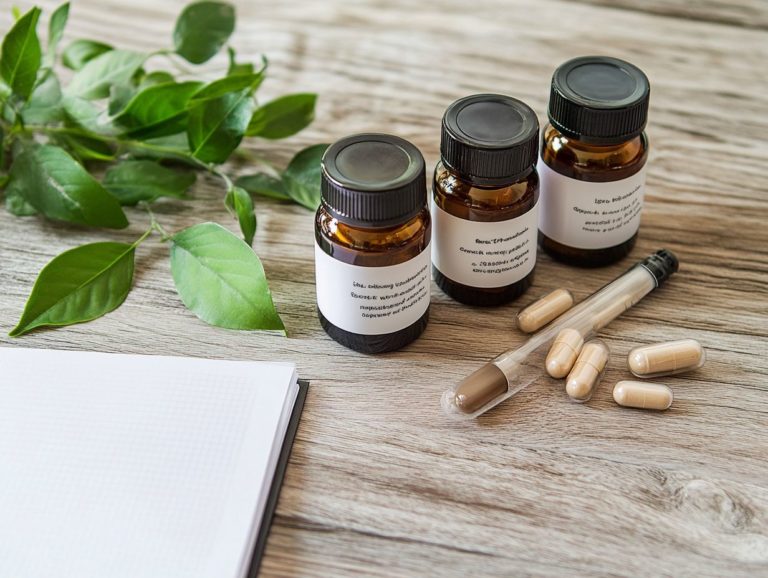5 Popular Herbal Supplements and Their Uses
Herbal supplements have become increasingly popular, celebrated for their potential health benefits and serving as natural alternatives to conventional medicine.
In this article, you ll explore five widely used herbal supplements: turmeric, ginseng, echinacea, ginkgo biloba, and aloe vera. Each section delves into what these herbs are, their unique benefits, and practical ways to weave them into your daily routine.
You ll also find tips on selecting the right supplements and important considerations to keep in mind. Discover how these powerful plants can elevate your wellness journey!
Contents
Key Takeaways:
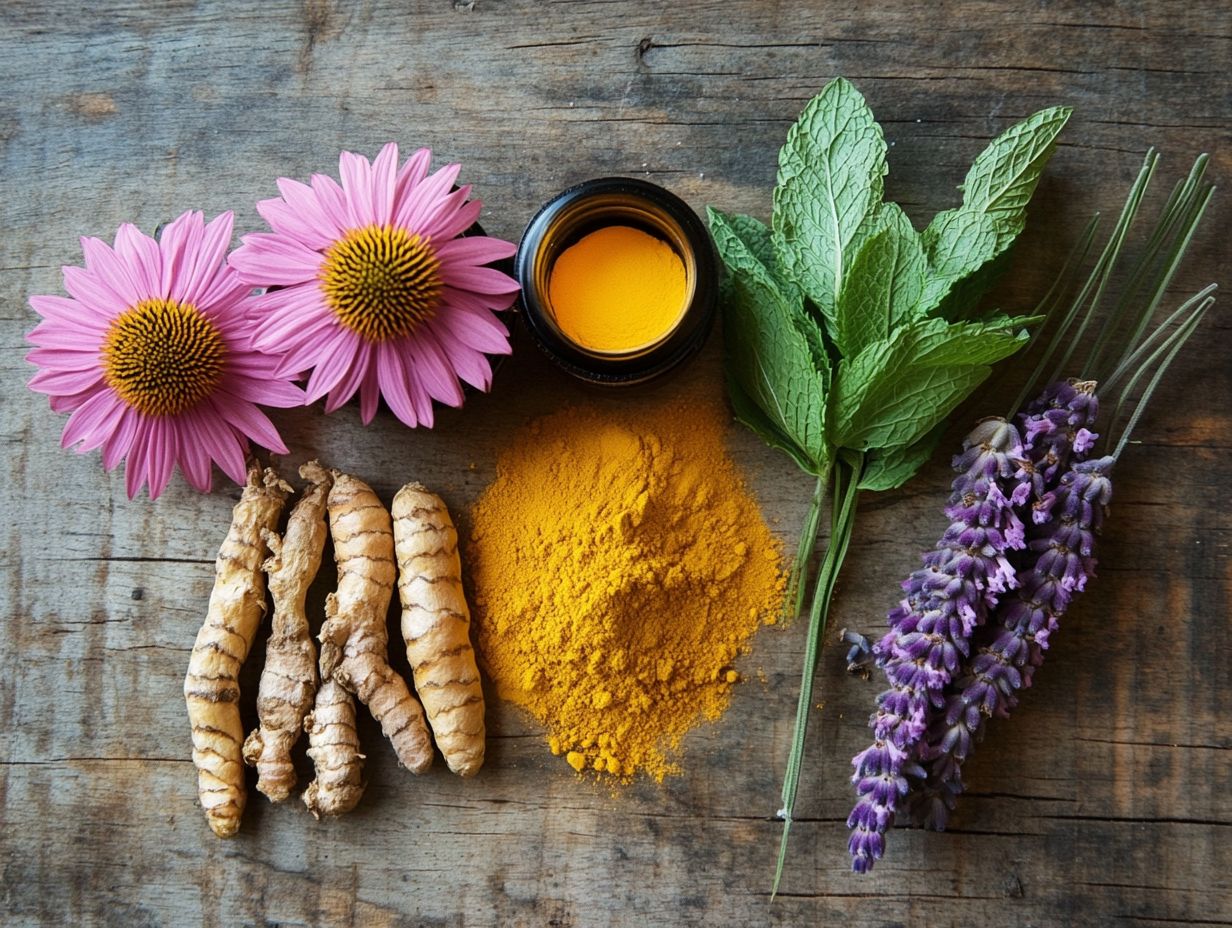
- Turmeric may have anti-inflammatory, antioxidant, and anti-cancer properties.
- Ginseng may help boost energy and reduce stress.
- Echinacea may strengthen the immune system and alleviate cold symptoms.
1. Turmeric
Turmeric is a bright yellow spice from the Curcuma longa plant. It has been a trusted remedy in traditional medicine for centuries.
This spice is rich in antioxidants, which are known to boost the body’s immune function and reduce inflammation.
Turmeric can support joint health and enhance overall well-being. It’s primarily valued for its anti-inflammatory and analgesic effects.
Recent research continues to unveil the spice’s role in managing chronic conditions, promoting digestive health, and offering neuroprotective benefits. In dietary guidelines, turmeric serves as a flavorful addition to your meals and a powerful ally in maintaining health.
What Is Turmeric?
Turmeric is a flowering plant from the ginger family, known for its bright yellow root. This root is used as both a spice in cooking and as a herbal remedy.
Known botanically as Curcuma longa, this perennial thrives in tropical climates and is distinguished by its expansive green leaves and vibrant yellow flowers.
The rhizome functions as the underground stem, typically harvested and turned into a fine powder for various culinary and therapeutic uses.
Historically, turmeric has significant value in Ayurveda and traditional Chinese medicine, celebrated for its anti-inflammatory and antioxidant properties. Its legacy underscores its culinary importance and its role in holistic healing practices.
Benefits of Turmeric
Turmeric packs a punch with its amazing health benefits! Supported by extensive research, it is known for its antioxidant properties, anti-inflammatory effects, and potential to boost your immune system.
Studies show its effectiveness in managing chronic conditions like arthritis, helping reduce joint inflammation and pain. This allows you to regain enhanced mobility.
Turmeric also shows promise in alleviating digestive issues, contributing to gut health by modulating liver function and stimulating bile production.
These medicinal properties blend beautifully with integrative medicine practices, emphasizing holistic approaches to health. By incorporating natural ingredients like turmeric into your daily routine, you’re taking proactive steps toward optimal well-being.
How to Use Turmeric
Turmeric can be utilized in various forms think powder, capsules, and extracts. This offers you a flexible approach to incorporate this golden spice into your life as a dietary supplement or herbal remedy. However, it s essential to consider its safety and effectiveness based on your unique health needs.
If you re eager to add turmeric to your diet, powder might be your best bet. It effortlessly blends into soups, smoothies, and curries, making it a versatile choice. For those who prefer a more straightforward route, capsules provide a measured dosage without any fuss.
Extracts can serve as powerful allies when used in tincture form. Generally, adults are advised to consume between 500 to 2000 mg of turmeric daily. Remember, this can vary depending on specific health conditions.
A touch of caution is warranted, especially if you re on blood thinners. Turmeric may interact with these medications and alter their effectiveness. Before diving into any new supplement, make sure to consult your healthcare provider it s essential for your safety!
2. Ginseng
Ginseng, a treasured herbal supplement rooted in traditional medicine, is widely recognized for its remarkable health benefits. It enhances your energy levels, supports immune function, and offers anxiety-relieving effects. This makes it a sought-after choice for those exploring natural remedies for their well-being.
Among its varieties, Asian ginseng scientifically known as Panax ginseng stands out for its invigorating properties. It is often employed to combat fatigue and boost cognitive function. In contrast, American ginseng, or Panax quinquefolius, is prized for its calming effects and its ability to help regulate stress responses.
Historically, ginseng has been revered in Eastern medicine for centuries. It promotes longevity and vitality. Today, ginseng is making waves in modern medicine! It merges ancient wisdom with contemporary health practices, appealing to an ever-growing audience interested in holistic health solutions.
What Is Ginseng?
Ginseng is a perennial plant known for its esteemed stress-relieving qualities. This makes it a cornerstone in herbal products across numerous cultures.
You ll often find this remarkable plant thriving in the temperate forests of North America and Asia. It is distinguished by its green, hand-shaped leaves and delicate clusters of berries. For centuries, ginseng has been held in high regard, particularly in traditional Chinese medicine. It has been harnessed to enhance vitality, boost cognitive function, and alleviate stress.
The unique compounds, known as ginsenosides, are vital for its health benefits. These compounds establish ginseng as a key ingredient in various herbal formulations. Today, ginseng continues to blend ancient wisdom with modern herbalism, appealing to those like you who are in search of natural remedies for enhanced wellness in our fast-paced world.
Benefits of Ginseng
Ginseng is truly a gem when it comes to health benefits. There s solid scientific backing for its ability to enhance energy levels, reduce fatigue, and boost immune function. It s no wonder it stands out in the world of herbal supplements!
Research suggests that this remarkable adaptogenic herb can elevate cognitive function and mental clarity. This enables you to stay focused even in the most stressful situations. Various studies underscore its potential to regulate blood sugar levels, which can be a game-changer for anyone managing diabetes.
Ginseng has well-documented anti-inflammatory properties that significantly contribute to your overall health. By promoting better circulation and reducing the risk of chronic diseases, it serves as an essential ally. Regularly incorporating ginseng into your routine can lead to an improved mood and enhanced stress management, elevating your overall wellness and vitality.
Explore more about ginseng and turmeric to enhance your health and wellness journey!
How to Use Ginseng
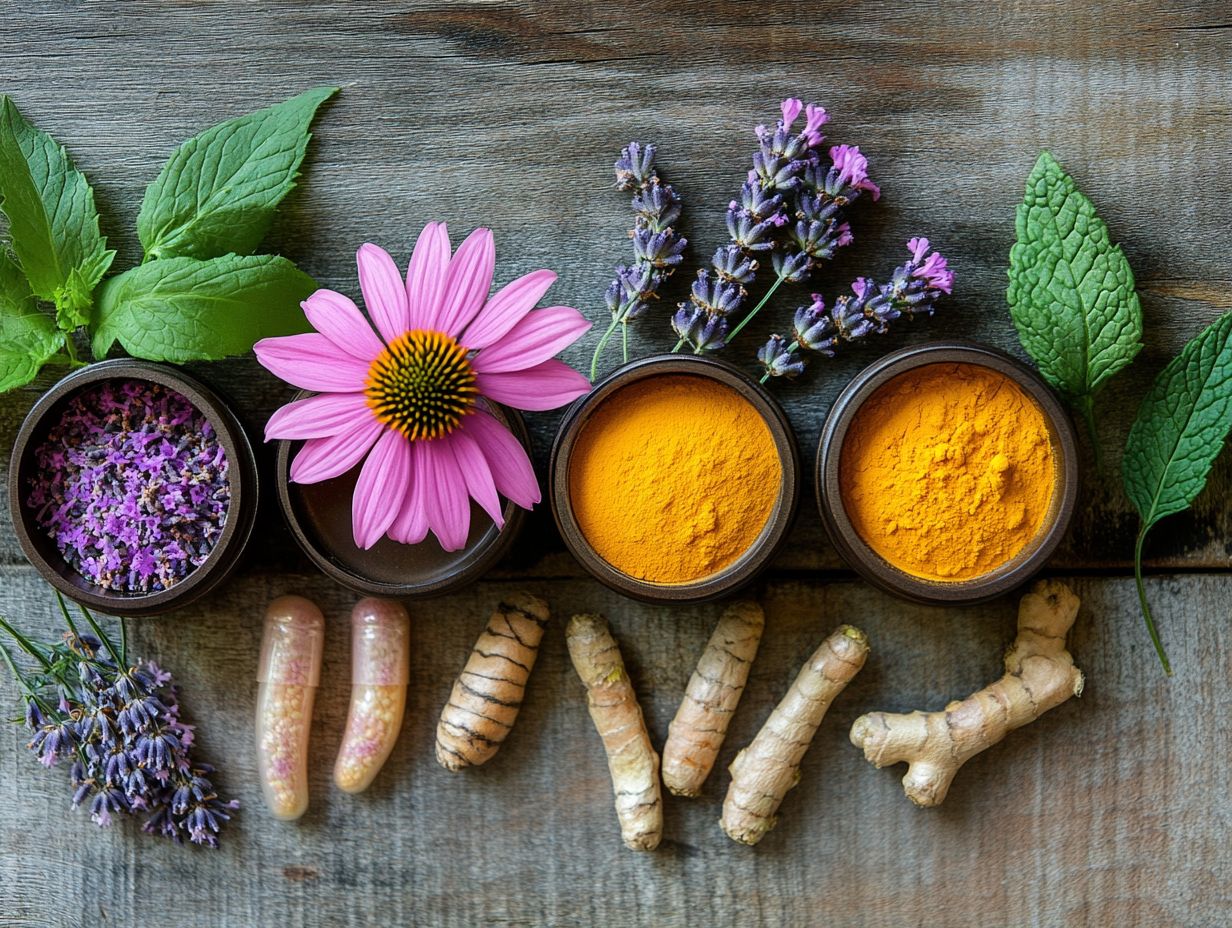
Ginseng offers various options, such as teas, capsules, and extracts. This gives you the flexibility to choose what suits you best.
Different preparations can vary in strength. Daily doses usually range from 200 mg to 2,000 mg, depending on your health needs.
Many individuals seek ginseng for its possible health benefits, including increased energy and improved cognitive function. However, it’s crucial to stay informed about potential side effects, which may include insomnia, headaches, digestive upset, and, in some cases, allergic reactions.
If you are on medications, talk to your doctor to ensure there are no adverse interactions. You can make well-informed decisions regarding your ginseng use and enjoy its benefits safely.
3. Echinacea
Echinacea is a popular herbal remedy known for its immune-boosting capabilities. It s your go-to option when seeking relief from the common cold and other respiratory issues, deeply rooted in traditional medicine.
With several species, including Echinacea purpurea, Echinacea angustifolia, and Echinacea pallida, each type offers unique health benefits tailored to your wellness journey.
Historically, Native American tribes used echinacea for its remarkable healing properties, treating infections and wounds long before it gained modern attention.
Contemporary research supports these historical claims. Studies indicate that echinacea can enhance immune function by stimulating the production of white blood cells, essential for warding off pathogens.
Regular use may reduce the duration and severity of colds, solidifying its vital role in herbal remedies.
This blend of history and science elevates echinacea in the realm of overall health and balance in your life.
What Is Echinacea?
Echinacea stands out with its vibrant flowers from the daisy family. It s renowned for its role in herbal products that aim to enhance health and well-being, thanks to its impressive medicinal properties.
This genus includes several species, with Echinacea purpurea, Echinacea angustifolia, and Echinacea pallida being the most commonly used in herbal remedies. You ll easily recognize them by their daisy-like blossoms, thriving in sunny, open areas across various habitats in North America.
Historically, indigenous tribes in the Great Plains relied on echinacea for its healing prowess, addressing ailments from infections to snake bites. As its reputation spread, echinacea became sought after in modern herbal medicine for its potential to boost the immune system.
Benefits of Echinacea
The health benefits of echinacea are impressive, especially its immune-boosting properties. This herb has gained popularity for its ability to reduce the duration and severity of colds.
Numerous studies suggest that this herbal powerhouse can activate various immune cells, enhancing your body s capacity to combat respiratory infections. For example, research published in the journal Clinical Therapeutics reveals that echinacea extracts can significantly reduce upper respiratory infections, positioning it as a valuable ally during cold and flu season.
As you explore integrative medicine, you’ll find that echinacea’s potential shines even brighter. Practitioners increasingly combine conventional treatments with natural remedies to create a holistic approach to healthcare. This strategy addresses symptoms while targeting underlying vulnerabilities in the immune system, promoting overall well-being.
Don t wait until cold season hits try echinacea today! Talk to your doctor to start enjoying the benefits of ginseng and echinacea.
How to Use Echinacea
Echinacea comes in a delightful variety of forms, including teas, tinctures, and capsules. This gives you the flexibility to choose the method of consumption that suits your lifestyle best.
For a boost to your immune system, recommended dosages can vary by form. Tinctures are typically taken in doses of 15-20 drops, while capsules generally suggest 300-500 mg. If you prefer tea, steep about 2-3 grams of dried echinacea in hot water for a refreshing beverage that provides its benefits.
Be aware that echinacea can interact with certain medications, such as immune suppressants, and may not be suitable for everyone. Therefore, consult with a healthcare professional before starting any echinacea regimen to prioritize safety and proper use.
4. Ginkgo Biloba
Ginkgo biloba is a natural herbal supplement that many people trust for boosting memory and brain function. This ancient herb is a favored choice for those seeking natural remedies for mental clarity and overall brain health.
This remarkable tree has a long history in traditional Chinese medicine, where it has been used for thousands of years to boost circulation and alleviate age-related symptoms. The leaves of Ginkgo biloba contain unique active ingredients, including flavonoids and terpenoids, known for their antioxidant properties. These ingredients are believed to enhance blood flow to the brain, supporting cognitive health and potentially protecting against brain conditions that worsen with age.
Today, Ginkgo biloba is a go-to choice for many! It is often marketed as a natural solution for enhancing memory, focus, and overall cognitive performance, particularly appealing to those looking to sharpen their mental acuity.
What Is Ginkgo Biloba?
Ginkgo biloba is a remarkable tree species, cherished for its leaves, which are widely featured in herbal products designed to enhance cognitive health and overall well-being.
This ancient plant, often called a living fossil, has distinctive fan-shaped leaves that turn a stunning yellow in autumn. Known for its resilience, it thrives in various climates and urban environments, making it a popular choice for landscaping projects.
Historically, ginkgo biloba has been at the heart of traditional medicine for centuries, especially in Chinese herbal remedies. It was believed to bolster memory and improve circulation. The leaves are rich in potent active compounds like flavonoids and terpenoids, thought to provide protective benefits by enhancing blood flow to the brain and potentially mitigating age-related cognitive decline.
Benefits of Ginkgo Biloba
The health benefits of ginkgo biloba are well-documented, particularly its role in enhancing memory and improving cognitive function, backed by scientific evidence.
Numerous studies indicate its potential to boost circulation and increase blood flow to the brain essential for maintaining mental sharpness and focus. Research published in reputable journals like ‘Psychopharmacology’ shows that ginkgo extracts can improve cognitive performance in individuals experiencing age-related decline. This remarkable herb possesses antioxidant properties that combat oxidative stress and reduce inflammation, further contributing to its neuroprotective effects.
Don’t wait to enhance your memory; try Ginkgo biloba today! Many are turning to this herbal supplement to boost their cognitive health and enhance their overall well-being.
How to Use Ginkgo Biloba
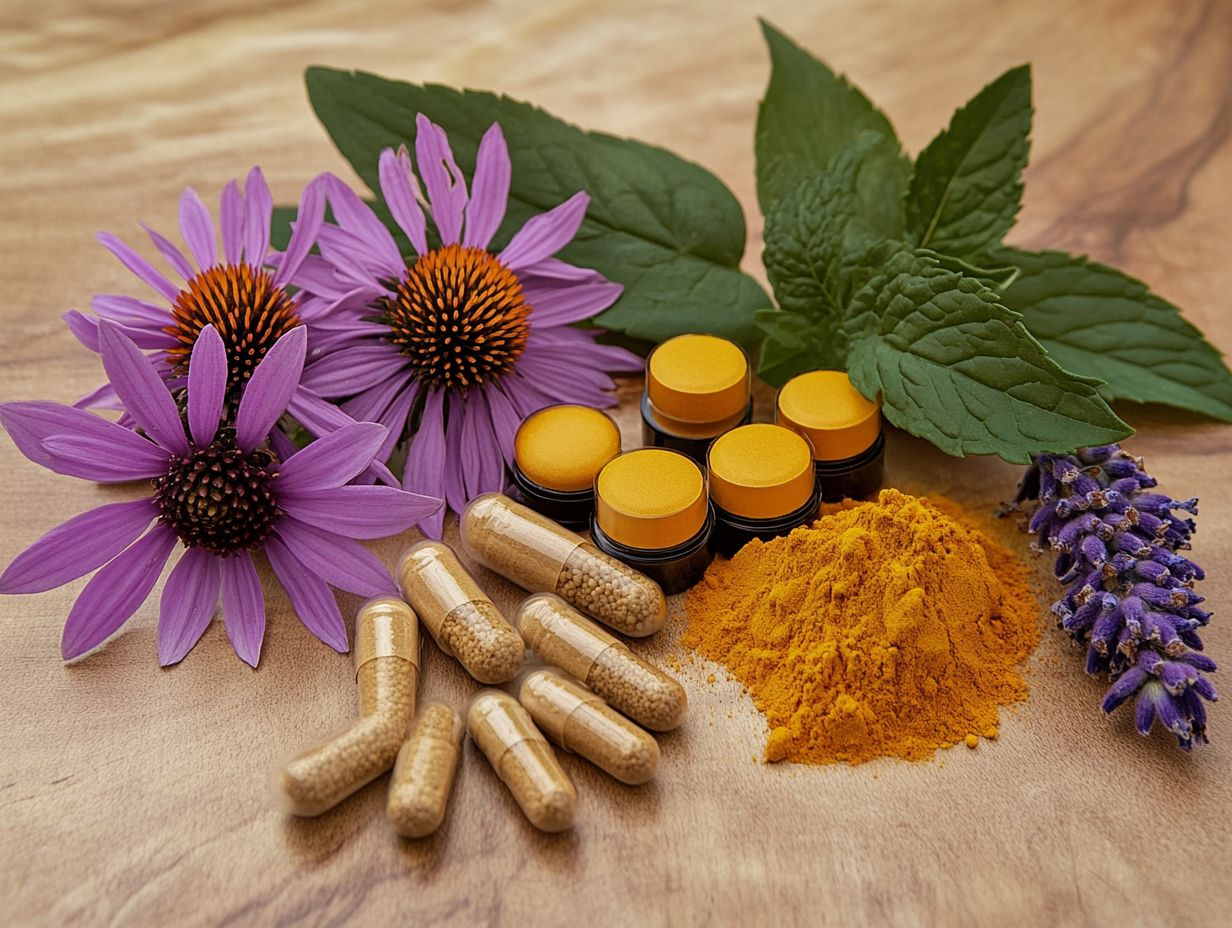
Ginkgo biloba comes in various forms think capsules, tablets, and teas offering flexible options to suit your preferences. However, it s crucial to remain aware of potential risks and consult with healthcare providers to ensure safe usage.
Incorporating ginkgo biloba into your daily routine can be effortlessly simple. You might take a capsule with your breakfast or brew a soothing cup of ginkgo tea in the afternoon. If you’re curious about dosage, many experts suggest starting with a standard amount of 120 to 240 mg per day, divided into two or three doses to enhance absorption.
It’s important to keep an eye out for any negative side effects, such as stomach upset or headaches. If you re on blood thinners, exercise caution, as ginkgo may heighten bleeding risks. Discussing any potential interactions with a healthcare professional before diving in is always a wise move.
5. Aloe Vera
What Is Aloe Vera?
Aloe vera is a remarkable succulent known for its thick, fleshy leaves containing a gel-like substance, making it a staple in herbal products due to its acclaimed medicinal properties. This fascinating plant, part of the Asphodelaceae family, flourishes in arid environments and features striking spiky edges along its long, lanceolate leaves.
Regarding harvesting, you ll carefully cut the outer leaves close to the base, ensuring the precious inner gel remains intact for extraction. Throughout history, aloe vera has played a significant role in traditional medicine, with civilizations from ancient Egypt to China utilizing its soothing gel for treating burns, skin ailments, and overall wellness.
Its rich legacy highlights not only its practical benefits but also its cultural significance as a symbol of healing and protection.
Benefits of Aloe Vera
The health benefits of aloe vera are truly remarkable. This plant is a vital ingredient in numerous herbal remedies, showcasing its effectiveness in addressing skin inflammation and digestive concerns.
Aloe vera is celebrated for its soothing properties when it comes to burns and its ability to expedite wound healing backed by a 2018 review in the Journal of Ethnopharmacology. Its impressive hydration capabilities can be beneficial whether applied topically or consumed.
Research indicates that aloe vera can significantly enhance skin moisture and elasticity, making it an excellent choice for those dealing with dry skin issues. Moreover, preliminary studies suggest that aloe vera plays a noteworthy role in digestive health; the compounds within this remarkable plant have been linked to improved gut health and a reduction in symptoms associated with irritable bowel syndrome.
Don’t miss out on the healing power of aloe vera! It further cements its reputation as a natural remedy cherished by many.
How to Use Aloe Vera
Aloe vera is a powerhouse for your health! It offers a range of applications, from gels to juices and capsules, allowing you to choose what best suits your needs. However, it s important to be aware of potential risks. Consult a healthcare provider to ensure safety and effectiveness.
These various forms cater to different preferences. You might apply aloe vera gel topically for skin benefits. Alternatively, you might opt for juice to support your digestive health. Recommended dosages can differ depending on the form and your individual health conditions. Some experts suggest consuming a few ounces of juice daily, along with specific gel applications as needed.
It s crucial to remain mindful of possible side effects, such as stomach issues or allergic reactions. By consulting a healthcare provider, you can determine appropriate dosages and confirm that using aloe vera aligns well with any pre-existing health conditions or medications.
How to Choose the Right Herbal Supplements for You
Choosing the right herbal supplements requires a thoughtful approach. Assess your individual health needs, potential risks, and the safety and effectiveness of the products. Consulting with a healthcare provider is essential.
Several important factors influence this process. First, assess your personal health conditions, including existing illnesses or medications, to prevent negative effects. Understanding where the ingredients are sourced is equally important, as quality can vary significantly across different brands.
While the FDA regulates some aspects of herbal supplements, it does not guarantee their safety or effectiveness before they reach the market. Collaborating with healthcare professionals empowers you to make informed choices that align with your overall health strategy.
What to Consider When Choosing Herbal Supplements
When selecting herbal supplements, it s essential to assess their safety and effectiveness. Understand the dietary guidelines and potential risks involved in their use.
Start by examining the quality of the ingredients and their sourcing. These factors can greatly influence both effectiveness and safety. Seek out research that supports the claims made by these products, ensuring they have undergone rigorous testing.
Be aware of any possible side effects or interactions with other medications. This awareness can help you avoid negative effects. By adhering to established dietary guidelines, you ensure a comprehensive approach to your health.
Consulting with a Healthcare Professional
Consulting with a healthcare professional is essential when considering herbal supplements. They can offer personalized insights on safety and effectiveness tailored to your specific health conditions.
These experts have the expertise to assess your unique needs, including any pre-existing medical issues and allergies that might complicate your supplement journey. They can help identify potential risks linked to various herbal remedies. This guidance is crucial, as some supplements might amplify or diminish the effects of conventional therapies, leading to unforeseen consequences.
By involving a professional in your discussions about herbal options, you position yourself to make informed choices that prioritize your well-being. Ensure a holistic approach to managing your health!
Possible Side Effects and Interactions
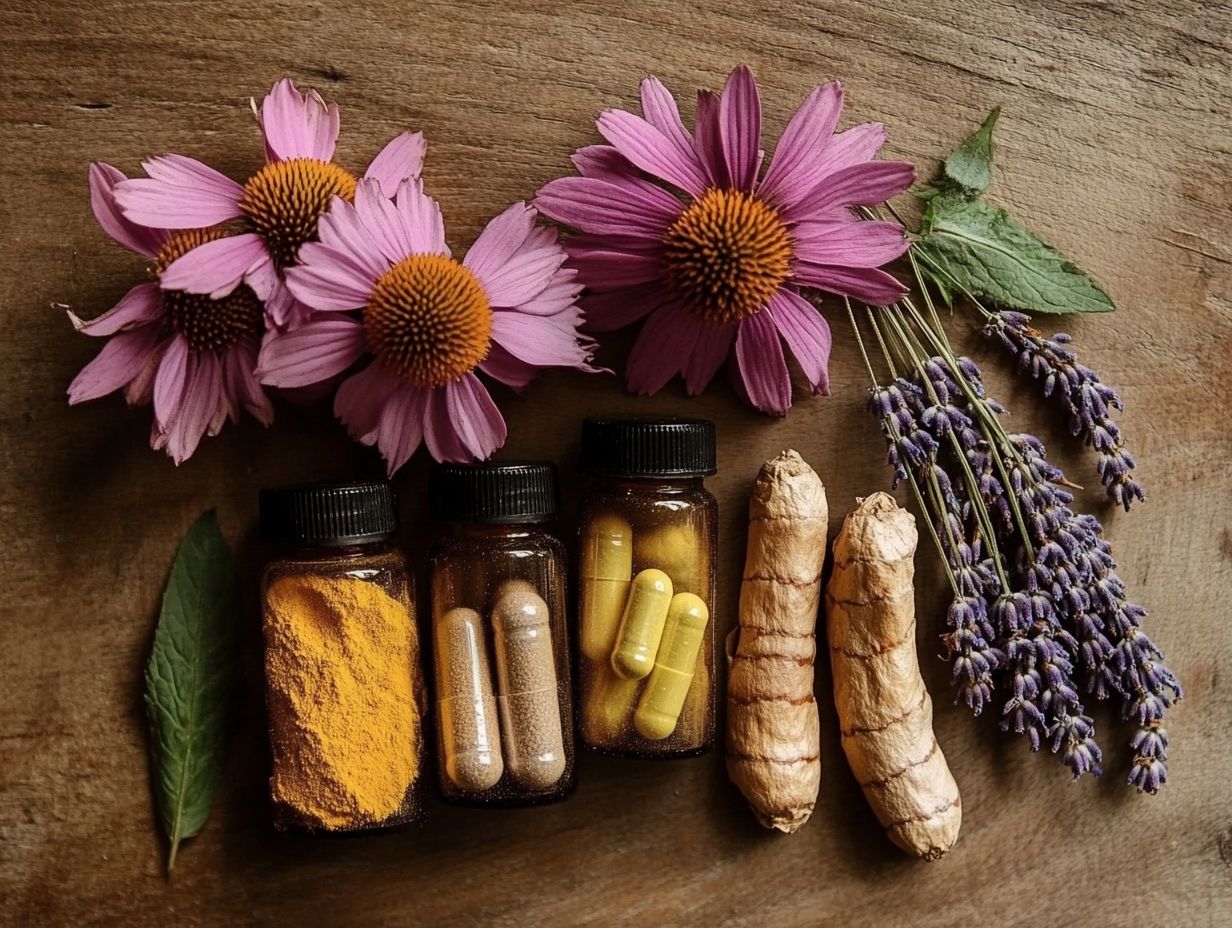
Understanding the potential side effects and interactions of herbal supplements is crucial for your safety. Certain products may lead to negative interactions with other medications or health conditions.
While these natural remedies can offer benefits, they also come with risks. Take St. John s Wort, for instance it can interact with antidepressants, leading to unwanted side effects. Similarly, garlic and ginkgo biloba can affect blood clotting, increasing the risk of bleeding, especially if you’re taking blood thinners.
Echinacea is popular for supporting the immune system. However, it can cause allergic reactions in some people or lead to liver issues when mixed with specific medications. Staying aware and cautious is essential, especially given the lack of regulation in the herbal industry.
Not all products are created equal. Just because you don t experience adverse effects doesn t mean they aren t lurking under the surface.
How to Incorporate Herbal Supplements into Your Daily Routine
Incorporating herbal supplements into your daily routine can enhance your overall wellness. It s essential to approach this thoughtfully, ideally with guidance from a healthcare provider to maximize the benefits.
To truly harness the power of these natural remedies, consider the timing of your doses. Some herbs perform better when taken with meals, improving absorption, while others yield better results on an empty stomach. Adhering to recommended dosages is crucial. Taking more doesn t guarantee better outcomes and could even be counterproductive.
Maintaining a balanced diet rich in vitamins and minerals alongside your herbal support is vital. This creates a synergistic effect that amplifies overall effectiveness and promotes good health. Keep a journal to track your responses. This can be invaluable in refining your approach.
Frequently Asked Questions
What are the 5 popular herbal supplements and their uses?
The 5 popular herbs with culinary uses include ginger for digestion, turmeric for inflammation, ginseng for energy and focus, echinacea for immune support, and chamomile for relaxation and sleep.
How does ginger help with digestion?
Ginger contains compounds that stimulate saliva and bile production, aiding in breaking down food and improving digestion. It can also help alleviate nausea and stomach discomfort.
What is turmeric commonly used for?
Turmeric has powerful anti-inflammatory properties and helps reduce pain and swelling associated with conditions like arthritis and joint pain. It may also boost brain function and support heart health.
Why is ginseng a popular herbal supplement?
Ginseng is known for its ability to boost energy, improve cognitive function, and enhance focus and concentration. It is also believed to have anti-inflammatory and immune-boosting effects.
How can echinacea benefit the immune system?
Echinacea supports the immune system and helps prevent and treat the common cold and flu. It contains compounds that activate and strengthen the body’s natural defense mechanisms.
What are the calming effects of chamomile?
Chamomile has been used for centuries to promote relaxation and improve sleep. It contains compounds that have a calming and soothing effect on the body, making it a popular choice for those seeking a natural way to reduce stress and anxiety.
Don’t hesitate to reach out to your healthcare provider for personalized advice on incorporating herbal supplements into your routine.





